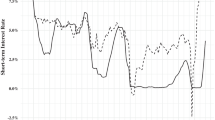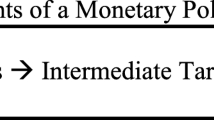Abstract
This paper analyzes the effects of International Monetary Fund (IMF) arrangements on the timing of inflation stabilization programs. By providing financial support that may allow the reduction of inflation without incurring politically unacceptable economic costs, the IMF can hasten stabilization. But, since support can also reduce the costs of inflation, it may instead delay it. Empirical results obtained for 10 countries that suffered from chronic inflation fail to support the hypothesis that IMF financial assistance accelerates stabilization. Rather, they indicate that other factors have a greater impact on the timing of stabilizations: greater fragmentation of the political system delays stabilization, while a higher level of inflation hastens it.
Similar content being viewed by others
References
Alesina, Alberto and Allan Drazen (1991) “Why are Stabilizations Delayed?” American Economic Review 81(5):1170–1188.
Ball, Richard and Gordon Rausser (1995) “Governance Structures and the Durability of Economics Reforms: Evidence from Inflation Stabilizations.” World Development 23(6):897–912.
Banks, Arthur C. (ed.) Political Handbook of the World, New York: McGraw-Hill, various issues.
Bird, Graham, Mumtaz Hussain, and Joseph P. Joyce (2004) “Many Happy Returns? Recidivism and the IMF.” Journal of International Money and Finance 23(2):231–251.
Bruno, Michael, et al. (eds.) (1988) Inflation Stabilization: The Experience of Israel, Argentina, Brazil, Bolivia, and Mexico. Cambridge, MA: MIT Press.
Bruno, Michael, et al., (eds.) (1991), Lessons of Economic Stabilization and its Aftermath. Cambridge, MA: MIT Press.
Calvo, Guillermo A. and Carlos A. Végh (1999) “Inflation Stabilization and BOP Crises in Developing Countries.⃑ In Taylor, John B. and Michael Woodford (eds.) Handbook of Macroeconomics, Vol. 1, Elsevier: Holland, pp. 1531–1614.
Casella, Alessandra and Barry Eichengreen (1996) “Can Foreign Aid Accelerate Stabilization?” Economic Journal 106:605–619.
Castro, Vítor and Francisco José Veiga (2004) “Political Business Cycles and Inflation Stabilization.” Economics Letters 83(1):1–6.
Cukierman, Alex, Sebastian Edwards, and Guido Tabellini (1992) “Seigniorage and Political Instability.” American Economic Review 82(3):537–555.
Dornbusch, Rudiger, Federico Sturzenegger, and Holger Wolf (1990) “Extreme Inflation: Dynamics and Stabilization.” Brookings Papers on Economic Activity 2(1990):1–64.
Drazen, Allan (2000) Political Economy in Macroeconomics. New Jersey: Princeton University Press.
Drazen, Allan and Vitorio Grilli (1993) “The Benefit of Crises for Economic reforms.” American Economic Review 83(3):598–607.
Dreher, Axel (2004) “IMF and Economic Growth: The Effects of Programs, Loans, and Compliance with Conditionality.⃑ University of Exeter, mimeo (Wopec reference: http://econwpa.wustl.edu:8089/eps/if/papers/0404/0404004.pdf).
Dreher, Axel and Roland Vaubel (2004) “Do IMF and IBRD Cause Moral Hazard and Political Business Cycles? Evidence from Panel Data.” Open Economies Review 15(1):5–22.
Evrensel, Ayse (2002) “Effectiveness of IMF-Supported Stabilization Programs in Developing Countries.” Journal of International Money and Finance 21(5):565–587.
Haque, Nadeem Ul and Mohsin Khan (1998) “Do IMF-Supported Programs Work? A Survey of the Cross-Country Empirical Evidence.” IMF Working Paper WP/98/169.
Hsieh, Chang-Tai (2000) “Bargaining Over Reform.” European Economic Review 44:1659–1676.
Hutchison, Michael M. and Ilan Noy (2003) “Macroeconomic Effects of IMF-Sponsored Programs in Latin America: Output Costs, Program Recidivism and the Vicious Cycle of failed Stabilizations.” Journal of International Money and Finance 22(7):991–1014.
International Monetary Fund, Annual Report, IMF: Washington D.C., several issues.
Joyce, Joseph P. (1992) “The Economic Characteristics of IMF Program Countries.” Economics Letters 38:237–242.
Kiguel, Miguel and Nissan Leviatan (1992) “The Business Cycle Associated with Exchange Rate-Based Stabilizations.” The World Bank Economic Review 6(2):279–305.
Knight, Malcom and Julio A. Santaella (1997) “Economic Determinants of IMF Financial Arrangements.” Journal of Development Economics 54:405–436.
Maddala, G.S. (1983) Limited-Dependent and Qualitative Variables in Econometrics. Cambridge: Cambridge University Press.
Mussa, Michael and Miguel Savastano (1999) “The IMF approach to economic stabilization.⃑ In, Bernanke, Ben and Julio Rotemberg (eds.) NBER Macroeconomics Annual 1999. Cambridge, MA: MIT Press.
Orphanides, Athanasios (1996) “The Timing of Stabilizations.” Journal of Economic Dynamics & Control 20(1–3):257–279.
Rodrik, Dani (1989) “Promises, Promises: Credible Policy Reform Via Signalling.” The Economic Journal 99:736–772.
Veiga, Francisco José (2000) “Delays of Inflation Stabilizations.” Economics and Politics 12(3):275–295.
Europa Publications (1957–1999) World Europa Yearbook, London: Europa Publications, several issues.
Author information
Authors and Affiliations
Corresponding author
Additional information
JEL Classification Numbers: E63, E31, F35
Rights and permissions
About this article
Cite this article
Joséveiga, F. Does IMF Support Accelerate Inflation Stabilization?. Open Econ Rev 16, 321–340 (2005). https://doi.org/10.1007/s11079-005-4738-0
Issue Date:
DOI: https://doi.org/10.1007/s11079-005-4738-0




